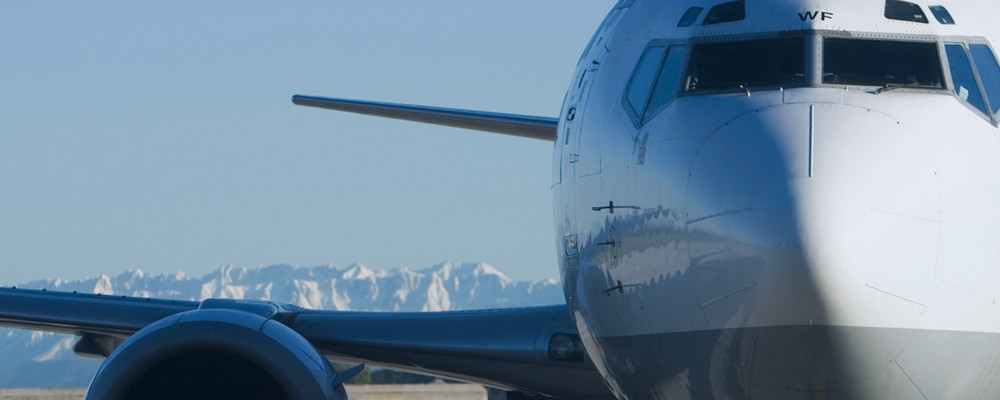Aeronautics Pathway
The Aeronautics Pathway is designed for students who want to take the first step on a path towards a degree program or career in Aeronautics.

This pathway provides Dual Enrollment students with the opportunity to gain exposure to a curriculum that is mapped to the needs and demands of the aviation/aerospace industry.
There are two options available:
Available to students taking Dual Enrollment courses online only.
An introductory course in aeronautical sciences that provides students an orientation in aviation topics appropriate to Aeronautical Science degree programs. Subjects include the aviation profession, the science of flight, safety, security and human factors; aviation resources; the aviation environment; and meteorology.
Pre-Reqs: None
Credits: 3
This course examines the evolution of federal civil aviation regulations in the United States. Students will examine the past and present problems prompting regulation of the industry, the resultant safety, legislation, airport development, funding legislation and international aviation legislation.
Pre-Reqs: None
Credits: 3
This course is a survey of Unmanned Aerial Vehicles (UAV) and systems, emphasizing the military and commercial history, growth and applications of UAVs. Course will include basic acquisition, use and operation of UAVs with an emphasis on operations.
Pre-Reqs: None
Credits: 3
Students are required to already have an understanding of traditional computer-based applications before beginning CSCI 109. These applications include word processing, basic spreadsheet use, basic database use, basic presentation software use, electronic mail, and accessing web resources via the Internet. The purpose of this course is to build on students’ existing knowledge of using computer systems and pertinent applications. Students will increase their skills with the most popular computer applications such as word processing, spreadsheet, electronic mail, presentation software, and Internet. Computer literacy is presented through lectures, discussions, and readings on the computer process, the impact of computers on society, emerging technologies, and hardware and software purchasing decisions.
Pre-Reqs: None
Credits: 3
This course introduces the student to the basic health and safety concepts associated with industry and transportation. Included are a comprehensive health and safety overview, a historical study of the legislative development and enactment of appropriate statutes, regulations and laws, the definition of safety terms, and a discussion of the ethics and professionalism required by the health and safety profession. This course also provides an introduction to the hazard recognition and reporting, evaluation, and control concepts used in risk management, accident investigation, ergonomics, and accident prevention.
Pre-Reqs: None
Credits: 3
This course is a study of basic descriptive and inferential statistics. Topics include types of data, sampling techniques, measures of central tendency and dispersion, elementary probability, discrete and continuous probability distributions, sampling distributions, hypothesis testing, confidence intervals, and simple linear regression.
Pre-Reqs: MATH 111 or MATH 140 or MATH 143 or MATH 241
Credits: 3
Survey course in elementary physics. Stress will be placed on basic concepts, principles and history of the development of physics. Presentation will include selected topics in mechanics, heat, light, sound, electricity and magnetism, and modern physics.
Pre-Reqs: MATH 106 or MATH 111 or MATH 140 or MATH 142 or MATH 143 or MATH 241
Available to students at our high school partnership locations.
This course includes high-level exposure to the foundation of collegiate-level coursework, history, careers, disciplines, and operations of the world’s aerospace industry. An introductory focus will be placed on aerospace physics (secondary education core curriculum components), engineering, management, operations, and maintenance.
Additional skills, such as academic strategies for success and exposure to distance learning modalities, will prepare secondary students for future collegiate studies. Upon completion of the single Carnegie Unit course (one academic year), students will be prepared for college-level course work in focused disciplines, and will also have an understanding of academic and career paths in aviation and aerospace.
Pre-Reqs: None
Credits: 0
This course provides the student with a background in the major aspects of space flight. Topics covered include the history of space flight; propulsion theory; orbital mechanics fundamentals; space transportation operations; U.S. space policy; and present and future commercial, industrial, and military applications in space.
Pre-Reqs: None
Credits: 3
This course develops the aeronautical knowledge required for certification as a Private Pilot with an Airplane Single Engine Land rating. Topics include; regulations, safety, pre-solo operations, cross-country planning, airspace, chart use, communications, weather, performance, weight and balance, aerodynamics and decision-making.
Pre-Req: None
Co-Req: ASCI 121L
Credits: 5
This course supports the aeronautical knowledge testing preparation required as part of the certification for the appropriate FAA certification or ratings. Students are introduced to airman’s knowledge testing (AKT) employed by the FAA and are also exposed to the electronic testing software and testing procedures.
Pre-Reqs: None
Co-Reqs: ASCI 121
Credits: 1
An introductory course in aeronautical sciences that provides students an orientation in aviation topics appropriate to Aeronautical Science degree programs. Subjects include the aviation profession, the science of flight, safety, security and human factors; aviation resources; the aviation environment; and meteorology.
Pre-Reqs: None
Credits: 3
An introduction to the fundamental concepts and topics of flight physiology. The course will explore basic anatomical systems, physiological effects on the human body such as vision and hearing, atmospheric effects, physical stressors, and physiological challenges to flight operations, including disorientation, loss of situational awareness, hypoxia, decompression, impairment and incapacitation.
Pre-Reqs: None
Credits: 3
This course provides an introduction and overview of the theories, concepts, applications and practices of the field of aerospace safety. This course is designed for the beginning aviation safety student and covers topics such as human factors, mechanical factors, accident investigation, safety programs and safety statistics.
Pre-Reqs: None
Credits: 3
